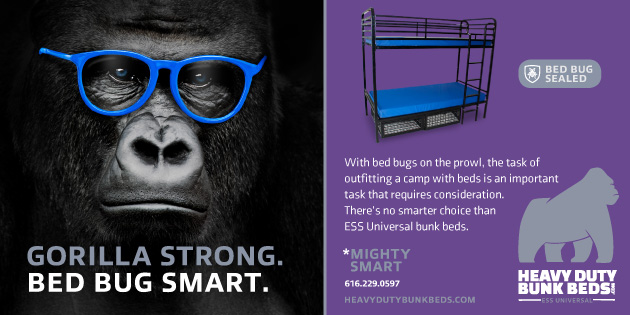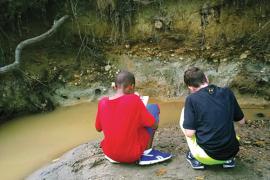The year 2020 was one of adversity. It was a year of dramatic change and tremendous loss for many. Loss of loved ones. Loss of income. Loss of business. Loss of treasured life experiences — graduations, proms, performances, showers, and weddings. It felt at times like being trapped between a horror movie and a reality TV show.
Last year dawned with the greatest of potential. The stock market was at an all-time high. Unemployment was at an all-time low. Many camps were fully booked and making capital improvements to their facilities. Then the wheels came off the bus.
Last January, COVID-19 began its inexorable march toward changing life as we knew it. The last time the world experienced a pandemic of such magnitude and severity was 1918’s Spanish flu.
What was the impact on the camp industry in 2020? What will the impact be for this new year and beyond?
You may remember me talking about “The Big 4” of camp risk before. The four areas are waterfront, sexual molestation, vehicles, and communicable illness. When dealing with communicable illness in the past, it was generally in the context of food-borne illness, such as salmonella and E. coli, or isolated communicable outbreaks such as measles and Zika virus.
The huge difference with COVID-19 is that it has affected every camp and community, suppliers, and the municipalities in which camps are located — all at the same time. Different state and local governments handled the response in different ways. Some camps opened with varying levels of success. Some that did open, and all that didn’t, had serious consequences. Most were disappointed to learn they had no insurance coverage in place to respond to business interruption caused by a pandemic.
So where are we now?
Many camps are experiencing significant decreases in deposits for the 2021 summer season. As with most things related to COVID-19, people are waiting for the last minute before making decisions. In 2020, many consumers experienced financial loss from deposits made on airline tickets, vacations, gym memberships, and other services and activities they invested in. They are now hesitant to try and predict what is coming. The failure to make summer deposits has put many camps in a position of having less working capital than would normally be required to get through this winter season.
The saving grace we have all been waiting for is a vaccine, and it is here. Several manufacturers announced successful trials late in 2020 and their plans to begin shipping the vaccine to treat health-care workers and first responders in mid-December and vaccinating in the first quarter of 2021. But there is no evidence yet that enough vaccine will be available before the start of the summer to vaccinate the general public in a meaningful way. There is also the issue of trust and the public’s willingness to take the vaccine. Based on the many variables, current information suggests we may not achieve immunity until late 2021 or even early 2022. Even then, it will still be possible to have outbreaks in areas where vaccination rates are low.
So where does this leave you as a camp owner? The answer to this question is yours alone. It hinges on your risk-tolerance level and your financial capacity to bear risk. Taking deposits and using them as working capital to prepare for all the things that must be done before opening day must be balanced with the need to provide refunds if your camp doesn’t operate. Are you able to weather the storm until you have a clearer picture? Do you have a reserve?
Regardless of your own financial circumstances, camp families are far better educated on the issue of COVID-19 than they were last summer. All will expect you to have a plan — and many will want to see it.
The planning process and procedures you develop to keep children and staff safe amidst the pandemic requires many critical decisions to made. Among them:
Infection Control
- Will you create an island or bubble environment at camp?
- Will you only take younger campers for whom infection transmission rates have been low?
- Will you require campers to be vaccinated?
- Will you structure the campers in pods?
- Will they wear masks?
- Will campers be required to quarantine before coming to camp?
- Will you require parents to attest to their child’s quarantine period? There were examples last summer of teenage campers being less than truthful about their activities before coming to camp, resulting in the spread of the virus where it could have been avoided.
- Will campers and staff need to present a negative test?
- Will they be tested once they get to camp and regularly thereafter?
- If someone tests positive, will they be sent home? What if there are vulnerable family members at their home? What about the others in their pod or cabin?
- Is there a critical mass of infected individuals that will lead to the camp closing?
- If camp must close, will the closing be temporary (e.g., two weeks to ensure no new cases) or will the camp close for the remainder of the summer? What are the variables that will impact your decision?
- How will you minimize transmission in vehicles? Buses and vans are difficult environments within which to control the spread of disease.
- What about the waterfront? While chlorine is known to kill the virus and the virus is not known to be transmitted in water, it is the density of people and inability to wear masks that creates concern around water activities.
- Have you thought about the impact that COVID has on sexual molestation? Even if you choose not to open camp for the 2021 season, and your general liability exposures have been significantly reduced, the sexual molestation issue remains very real. Online communications between staff/counselors and campers create opportunity for grooming and other sexual misconduct. Make sure to maintain appropriate insurance to address this exposure even if you are remaining closed.
Legal
- Will you ask families to sign waivers of liability related to COVID-19?
- Will you mandate vaccinations for staff and campers? Can you legally do so?
Financial
- Will there be tuition refunds if campers are sent home? Will you prorate them?
- Will you refund to families who become afraid once they learn someone at camp has tested positive?
- Have you investigated travel/accident insurance coverages in the market that may provide some financial relief to families who are impacted by an early closure of camp or a non-start to the camp season?
Once you have made these important decisions, and so many more that may arise between now and the start of camp, lay out your plan in writing. To instill confidence in your camp families, the plan must include not only what you plan to do but how you will do it. In other words, say, “There will be social distancing on the bus,” and explain, “Children will be masked, one student per seat, alternating left and right positions. Siblings may sit together. Seats will be blocked where no one can sit and will be marked where they can sit. Sanitizer will be at each seat.” Most importantly, after developing the plan, staff and camp families will require training and education on the plan, as well as on their individual role in making the plan successful.
As part of your preparation to open next summer, be sure to develop strategies for how you will communicate with all stakeholders on COVID-19-related issues. The portion of the plan that relates to communication with camp families should be shared with them before camp starts. For example, let families know they will be contacted by phone if their child develops symptoms or has had close contact with someone who tests positive. Let them know that for privacy reasons you will not be able to share names of any camper or staff member who tests positive.
Decide what approach you will take in communicating with the majority of camp that won’t have been exposed. Will you reach out to every camp family every time someone tests positive? This is where expectations need to be managed. Delivering unexpected news in writing to any parent is never recommended. Anyone you choose to communicate with should be contacted by phone. Could this mean you will be making hundreds or even thousands of phone calls over the summer? Absolutely. Is that doable? Absolutely. This approach not only gives families a chance to ask questions, but it helps to instill confidence in leadership. It also minimizes your exposure to the media and resulting impacts to brand and reputation. Anything you send in writing could end up surfacing in internet searches for years to come.
Many individual factors will influence your decision to open camp this year. Developing a plan will help you with your decision process. Make assumptions and plan for them. Assume the virus is not going away. Assume that even with a vaccine, not everyone will be vaccinated in time. Make a decision tree and develop alternative plans for every eventuality. While this approach will make you uncomfortable at times, it will enable you to make decisions and prepare you to respond as the situation evolves.
Is it over yet? Yes, 2020 is finally over, but the need to think about and plan for the 2021 season has just begun. There is reason for optimism, however, and hopefully updates in the coming months will give you more confidence in the decisions you make. Hope does spring eternal.
Suzanne Rhulen Loughlin is a founder of and general counsel for CrisisRisk Strategies, LLC. CrisisRisk™ works with leaders and boards of directors to identify strategic emerging threats and vulnerabilities that put critical assets — people, reputation, brand, key relationships, and financials — at risk. CrisisRisk develops strategies for mitigating those risks and prepares leadership teams to make decisions, take action, and effectively communicate when they materialize.
Photo courtesy of Liberty Lake Day Camp, Bordentown, New Jersey.



